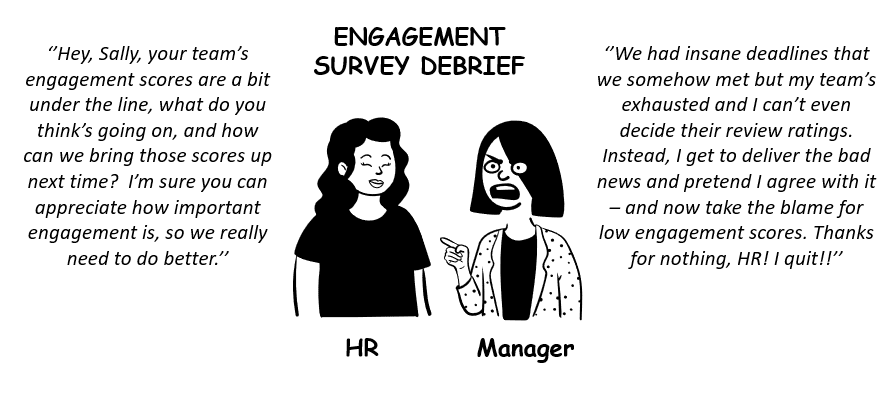
Managers in the Middle: The Great Disconnect between Managers and HR
today2022.04.14. 5368 5


Laura Schroeder, Brand Strategist | HR Tech Advisor | Scale Up Coach | Impact Investor | Speaker
WHY SHOULD YOU CARE?
Employee experience is essential for business success, however, a critical sub-group tends to get less attention than they require. Managers face unique challenges that put them at heightened risk of burnout. Left unattended, companies risk alienating this critical and expensive to replace talent segment.
I don’t think many folks would disagree these days that employee experience is an important pillar of business success, but there’s one group of employees who may not be feeling the vibe and that’s managers. Around all the recent hype about the great resignation, there’s also a mounting body of evidence that managers as a sub-group are increasingly overwhelmed and dissatisfied.
For example, research from Visier found that typical resignation patterns have changed over the last two years, with larger percentages of senior – and more costly to replace – employees leaving than previously. Reasons cited include pay, family obligations, and burnout caused by the expanded scope of manager responsibilities.
We all know the old adage that people leave managers not companies, and HR has led the charge on giving employees a voice and holding managers accountable for engaging and developing their team. While the impact this has had on weeding out poor leaders is unclear, at least there is now attention on the critical importance of quality leadership. On the flip side, however, the ever-growing list of responsibilities and sometimes conflicting expectations puts a burden on ‘good’ managers that’s increasingly difficult to carry.
A fascinating survey from Humu on manager v. HR priorities found a complete disconnect in what each group considers to be manager priorities. Whereas managers are focused on ensuring their teams are appropriately staffed and able to complete their work without burning out, HR priorities read more like a board meeting presentation with buzzwords like ‘agility’ and ‘transformation.’
Leaving aside the question of why HR is so poorly aligned with team leaders who execute their strategic priorities on a day-to-day basis, what’s really going on here? HR priorities reflect C-level priorities, which are at times out of touch with the rest of the business and fail to provide a clear roadmap for success.
Increasingly, managers are caught between the rock of having to deliver concrete business results and the hard place of being expected to individually nurture, develop and engage each member of their team. At first glance, there doesn’t seem to be any contradiction here because high performance, professional growth, and high engagement should go hand in hand.
You’d think, but it doesn’t always play out like that. A recent HBR article Managers Can’t Do It All paints a picture of a beleaguered manager trying to execute executive priorities like agility and transformation with over-extended direct reports and shrinking control over her team’s work and outcomes. To cap her feeling of overwhelm and failure, she gets a negative engagement survey from her team, who are – like her – frustrated by things outside of her control.
To that manager, her work experience might look something like this:
- In the calibration meeting, her boss overrules her performance review for one of the members of her team.

- This leads to a difficult conversation with her employee because she doesn’t agree with the assessment but has to act as if she does.

- When HR roles out the engagement survey, disgruntled employees who feel underappreciated express their dissatisfaction.

- In the follow-up debrief with HR, the manager feels attacked on all sides and put in an unwinnable situation.

This is an exaggerated scenario, and we can all think of ways the manager could have reacted more appropriately in each situation. Nonetheless, in addition to managing outcomes managers are now also on the hook for feelings, which are subjective and influenced by multiple factors that are outside a manager’s direct control.
Of course, any leader has to cope with factors that can’t be directly controlled but there’s a golden ratio of control v. non-control that continues to widen for middle managers with each new strategic initiative. The result is like a club sandwich in which executives, employees, and HR are the bread, and managers are squeezed in the middle like wilted lettuce.
Added to all this, the rise of hybrid and remote work has made the manager’s job even more demanding and complex as they try to navigate a new communication and leadership paradigm. According to this Fast Company article about manager burnout, being accountable for their team’s performance, well-being and engagement makes managers less likely to unplug and thus more vulnerable to burnout than other employee groups.
This is an opportunity for HR to align with this mission-critical employee group and provide much-needed active support for manager priorities like combating team burnout, retaining talent, hiring, and onboarding – so managers can focus on coaching and developing their teams, and also take the time they need to recharge.
How can HR support managers? Here are a few ways:
- Provide direct support for manager pain points – Managers have an important role to play, but it lies within HR’s remit to provide recruiting and administrative support for hiring managers, as well as a smooth onboarding experience for new hires.
- Help managers develop their teams – Providing personalized, on-demand training modules will enable people to learn efficiently while managing time and workloads more effectively.
- Equip managers for flexible work arrangements – Increased flexibility can help improve engagement and productivity out but leading remote or hybrid teams requires new skills and communication styles so it’s essential to make sure leaders are ready for the challenge.
- Have a transparent job level and pay structure – Offering a comprehensive career and rewards roadmap won’t magically make performance and development discussions easy but will help managers have more productive conversations.
- Implement meeting free days – Remote work has resulted in more meetings than ever and it’s time for a reset. To learn more about the impact of meetings and busy work on mental health and business performance, check out this short video Finding Your Flow in the Post-Pandemic World of Work.
To conclude, managers tend to get lumped in with employees when it comes to mental health and engagement strategies, but they face unique challenges that put them at heightened risk of burnout or flight. Left unattended, companies risk alienating this critical and expensive to replace talent segment.
Written by: Laura Schroeder
Employee Engagement HR Strategy Leadership Wellbeing
Previous post

- 2836
- 1
labelArticles today2022.04.14.
Six fearless talent choices that HR has to make in times of BANI
Farai Mugabe, Content & Research, The HR Congress WHY SHOULD YOU CARE?COVID-19 and the current challenges have taught us to be strong and brave whatever the world pushes at us. [...]
Similar posts

labelArticles today2024.10.21.
The success-recipe to build agile and future-ready organizations in 2025 and beyond







Post comments (0)